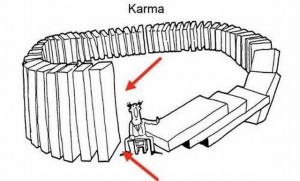6 Moksha
6-1 Preparation
6-2 Jnana, Jnani, and Jnana-Phala
6-2-6 Action, inaction, non-action 4(16 to 18), 18 (13 to 15) 6-2-6-1
4(16 to 18) Sri Krishna says that even sages are deluded about the nature of action, non-action, and inaction and offers to explain them so that upon knowing them, one is freed from the bondage of karma and samsara. An inquiry is important as people suffer from vague ideas about them. Action refers to action prescribed by scriptures. Non-action means prohibited action, i.e., not sanctioned by scriptures. Inaction is being idle. It is a cardinal mistake to think that the true nature of a person does any action and that it reaps the fruits of action.




